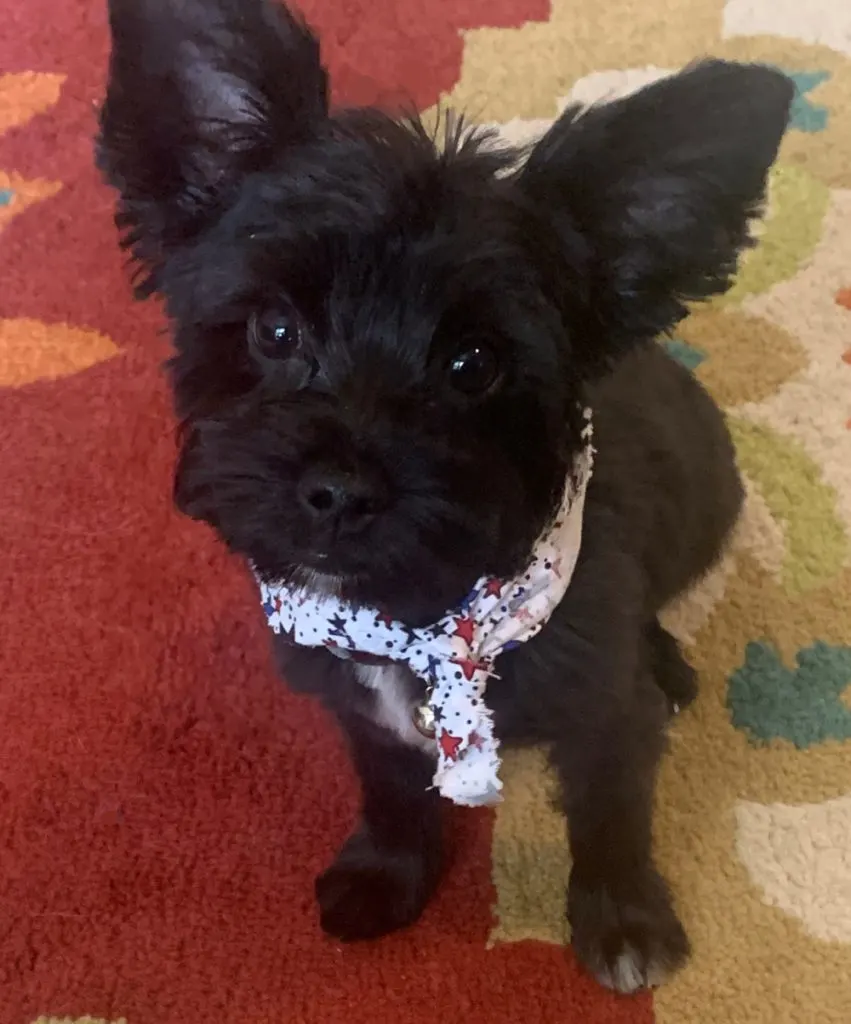Despite their cute and innocent looks, some Yorkies can be aggressive, yappy, and downright mean. Whether you’re a proud Yorkie parent or have had a run-in with one, you might have seen some barking, biting, nipping, and even attacking.
Even with good socialization and training, there are times when your Yorkie’s aggression seems to come out of nowhere.
Since aggression is a common issue with Yorkies, I’ve listed 10 reasons why they might get aggressive. Let’s dive in!

1. Genetic Predisposition
Most dogs aren’t born aggressive, but some breeds have a higher tendency to show aggression due to their genetics. While Yorkies aren’t usually aggressive by nature, over-breeding or genetic quirks can make some more reactive, anxious, or fearful than others.
But more often than not, a Yorkie’s environment has a bigger impact. If your dog is often stressed or lonely, they might start acting out aggressively to show their frustration.
2. Teething
From 4 to 8 months old, Yorkies go through teething, which can be pretty uncomfortable for them. This pain and discomfort can lead to biting, nipping, chewing, and some mean behavior.
It’s normal during this phase, but you can help by giving them chew toys and treats.
Something I used to do with both my human babies and puppies is to wet a clean washcloth, put it in a baggie, and freeze it. Let your teething puppy chew on the cold cloth to relieve discomfort, but keep an eye on them to prevent choking.
Freezing their teething toys can also help soothe their gums.
3. Lack of Socialization
Yorkies might have a reputation as lap dogs, but they get bored and crave interaction. Socializing your Yorkie from a young age is crucial because some may already tend to show aggression toward strangers.
If you don’t introduce your Yorkie to new places, people, and other dogs, they might act aggressively out of fear or discomfort.

4. Territorial Nature
They’ll protect whatever they think is theirs, like their home, people, toys, and food. You might see your pup act aggressively when visitors come over or when they feel their territory is threatened.
Your Yorkie might also get jealous if they see you with other dogs. This type of aggression doesn’t necessarily mean they’re dominant; they might just be scared or unsure how else to react.
5. Insufficient Exercise
If your Yorkie isn’t getting enough exercise, they might become aggressive. Without enough physical activity, they can get over-excited and frustrated, leading to behaviors like barking, nipping, biting, and growling.
To prevent this, make sure your pup gets plenty of exercise every day. A tired dog is a happy dog!
6. Medical Conditions and Pain
Sudden aggression when you touch your Yorkie could be a sign of pain or an underlying health issue. Yorkies are prone to various health problems, including skin infections, eye problems, and dental diseases.
If your pup is in pain, they might lash out when you try to handle them. Regular vet visits are important if your Yorkie shows aggression without an obvious cause.
7. Fear and Stress
Fear and stress are common reasons for Yorkie aggression. This can be triggered by new pets, loud noises, thunderstorms, or interactions with strangers.
You might see this type of aggression during walks when your dog encounters other dogs, or when strangers come to the house. If your Yorkie shows signs of fear or stress, handle the situation calmly and try to remove them from the stressful environment.
A Thundershirt can help calm them during fireworks or thunderstorms.

8. Loneliness
Sometimes you have to leave your Yorkie at home, but it’s not good to leave them alone for too long. Yorkies, in particular, are prone to separation anxiety because they love being with their humans.
Dogs are pack animals and need to be with others, whether that be other animals or their human family.
When left alone too long, they can become stressed and bored, leading to aggressive behaviors like chewing, barking, and nipping. If you have to be away for more than 3-4 hours, arrange for someone to check in on them, take them for a walk, and give them some attention.
Improper Handling
Experts don’t recommend leaving your Yorkie alone with young kids. Yorkies are small, and kids might unintentionally scare them. Children might not know how to handle these pups gently, and Yorkies dislike rough handling.
Your Yorkie might bite or attack if they feel threatened by kids’ rough play.
Unfamiliar People and Animals
Yorkies can act wild and mean toward strangers and other pets. They might feel threatened or think someone is invading their territory. However, with proper socialization and training, you can teach your pup to behave calmly around strangers.

To Wrap Up
Yorkies can get aggressive for many reasons, from stress and fear to jealousy and the need for attention. It could be a natural behavior, a medical issue, or just a sign of discomfort. Identifying the cause of their aggression is the first step to fixing it.
By understanding what’s behind the behavior and taking the right steps, you can help your Yorkie become a happier, more relaxed companion.


Cathy Bendzunas
Dog Blogger, Former Dog Groomer
I have adored Yorkies for well over 50 years. As a young adult, I began to show and breed them. Now, I just write about them and have several in my little pack of small dogs.
I have had dogs all my life and have trained as a dog groomer. I also have been a kennel worker, worked in a pet hotel through PetSmart, and still am a pet sitter.
Check out my bio for more information about me.

Lorene
Friday 16th of January 2026
I have a 5 year old spayed female Yorkie. She allows people to pet her for a few seconds and then she aggressively growls and nips them. She seems unsure and becomes scared. I usually tell people she will nip so not to pet her. I would like to have a socialized dog but not sure how to do that without people getting nipped. I say nipped because it’s not a hard bite and she never draws blood.
Cathy Bendzunas
Friday 16th of January 2026
She may need a dog behaviorist to correct this behavior but here's something you can try. The next time a visitor wants to pet her, hand them a few tiny high value treats and after several pets, have them give her one of the treats. This may help her realize that pets are a good thing. After a while you won't need the treats.
ronald caissie
Friday 10th of October 2025
i have a five month old yorkie papion mix. male showing aggresion towards me his owner. when time to go to bed in his crate. he has plenty of exercise chew toys me and the wife are both retired have socilized with other dogs peopletonight bite me. tried everything need guidance. have app to be neutered in dec. doggie trainnig in november. your terulu ronald caissie
Cathy Bendzunas
Friday 10th of October 2025
Yeah, if he's starting this as a puppy, that's not a good sign. Training should help and neutering may help too. Years ago, I asked a trainer I worked with at PetSmart about my puppy (named Buddy) who was also showing some aggression. He was American Bulldog/German Shepherd mix and ended up being about 85 pounds full grown so I definitely wanted to get it dealt with before he became an adult. My trainer friend told me that when he started to act aggressive to pick him up and hold him high in the air over my head until he calmed down. This usually just took a few seconds to a minute. Once he was calm I set him down and didn't give him any attention for a few minutes. A few times he would start growling as soon as I sat him down. So I would again pick him up and hold him up again. She said to do this every time it happened and within a few weeks, he stopped being aggressive altogether. He's long gone now but he turned out to be a sweet, loving dog. Now my Buddy never actually bit me but he did growl and snap at me. Since your dog is actually biting, you might want to wear a glove or use a dish towl to pick him up to protect your hands.
vicki
Thursday 7th of August 2025
Sure would like some advice on my yorkie that always whines in the car and when ever my husband comes in a room. She came to us with a lot of issues! Afraid of the world in which she lives. Breeder bred for quantity not quality. Did not know this until after the fact. I have helped her with alot of behavior but can’t seem to stop this one. Any advice would appreciated. i have trained and had many dogs .. three yorkies.. this one has been a challenge. She is 3 years old..
Thanks ahead of time
Cathy Bendzunas
Friday 8th of August 2025
How often does she ride in the car? If it isn't often, You can try taking her out in the car everyday and make it a positive experience. Take her to a park or a pet friendly store. Or through a Starbucks drivethru and get her a pup-cup. Just something she would enjoy so the car becomes a postive experience that she will look forward to. As for your husband, you ccan get him to start feeding her, and take her for walks so she will bond more to him. If nothing seems to help, you can get CBD oil for pets that should help with her anxiety. It worked well for several of my pet sitting clients and I have used it on one of my dogs about 8 years ago with good results.
Missy H
Thursday 10th of July 2025
Our Yorkie pup (about 15 weeks old) is VERY aggressive and constantly jumping on our 13 year old Yorkie and biting her ears. We have to pull her off nonstop and they have had a few skirmishes, although only a few seconds before we put a stop to it. She also gets very bitey with us. Do you have any ideas on how we can help her learn how to play with our older dog without constantly attacking her?
We also can't leave her in a crate or playpen. She chews on them the whole time and hurts her mouth to the point she cries because it hurts. We can't be here 24 hours a day! But feel we have to at this point.
Any ideas for this headstrong little girl? We've had many dogs over the years, but none as aggressive as this pup.
Missy H
Monday 24th of November 2025
@Cathy Bendzunas, thanks, I'll watch the video. Our pup is eight months now, and unfortunately, more aggressive than ever with the older dog and very reactive to everything. We're starting an online course with Spirit Dog training this week and hoping it might help.
Cathy Bendzunas
Friday 11th of July 2025
A lot of this may be puppy rambunctioness that will calm down over time. Usually it's something the dogs work out between themselves. The older one will have to put her in her place a few times so unless one of them is being hurt during their skirmishes, hold off for a minute. This video is worth watching, but skip the first 40 seconds: https://youtu.be/7dGPRE2td_E?si=jJifqv7pXwfmcV5I She does sound high-spirited though and you should get her in some puppy training classes as soon as she is old enough.